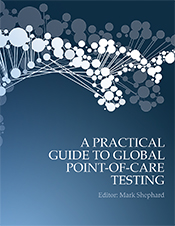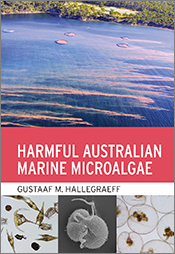A Practical Guide to Global Point-of-Care Testing
Edited by: Mark Shephard OAM
A guide to point-of-care testing for health professionals in primary care settings.
Point-of-care testing (POCT) refers to pathology testing performed in a clinical setting at the time of patient consultation, generating a rapid test result that enables informed and timely clinical action to be taken on patient care. It offers patients greater convenience and access to health services and helps to improve clinical outcomes. POCT also provides innovative solutions for the detection and management of chronic, acute and infectious diseases, in settings including family practices, Indigenous medical services, community health facilities, rural and remote areas and in developing countries, where health-care services are often geographically isolated from the nearest pathology laboratory. + Full description
A Practical Guide to Global Point-of-Care Testing shows health professionals how to set up and manage POCT services under a quality-assured, sustainable, clinically and culturally effective framework, as well as understand the wide global scope and clinical applications of POCT.
The book is divided into three major themes: the management of POCT services, a global perspective on the clinical use of POCT, and POCT for specific clinical settings. Chapters within each theme are written by experts and explore wide-ranging topics such as selecting and evaluating devices, POCT for diabetes, coagulation disorders, HIV, malaria and Ebola, and the use of POCT for disaster management and in extreme environments. Figures are included throughout to illustrate the concepts, principles and practice of POCT.
Written for a broad range of practicing health professionals from the fields of medical science, health science, nursing, medicine, paramedic science, Indigenous health, public health, pharmacy, aged care and sports medicine, A Practical Guide to Global Point-of-Care Testing will also benefit university students studying these health-related disciplines.
- Short descriptionNews
This title is no longer available in print, but can still be purchased as an eBook.
Reviews
"Importantly, this book moves far beyond the few basic tests to a comprehensive suite of investigations to match the reader's location and needs... for those with a keen interest in the topic, this comprehensive book may prove to be a cornerstone in the maturation of this important component of clinical practice."
Professor Stephen A Margolis, Australian Family Physician, December 2016
"For those new to using or planning a PoCT service, the information and experiences outlined in here would be invaluable. Equally it would be valuable to those considering expanding an existing service into new areas... I would recommend this book to anyone either working or considering working the PoCT area. It has a broad based appeal making it suitable for medical, nursing, and scientists at both under and post graduate level. It should be compulsory reading for all med lab science students."
Cameron Martin, Australian Journal of Medical Science 38(2), May 2017
"Prof. Shephard and the other contributors have provided us with a comprehensive review of near patient testing that will be found to be relevant by both the novice and those experienced in POCT management alike."
David Hughes, Clinical Biochemist Newsletter, September 2019
Details
ePDF | November 2016ISBN: 9781486305193
Publisher: CSIRO Publishing
Available from eRetailers
ePUB | November 2016
ISBN: 9781486305209
Publisher: CSIRO Publishing
Available from eRetailers
Features
- An easy-to-read, yet authoritative text written by national and global experts in the field
- Simple figures illustrating the concepts, principles and practice of POCT
- Summary tables, consolidating evidence-based literature
- Up-to-date reading lists
Contents
About the editorContributors
Preface
Chapter 1: An introduction to point-of-care testing and its global scope and application
The Management of Point-of-Care Testing (POCT) Services
Chapter 2: Principles of establishing and managing a point-of-care testing service
Chapter 3: Selection and evaluation of point-of-care testing devices
Chapter 4: Training and competency assessment for device operators
Chapter 5: Quality management of point-of-care testing devices
Chapter 6: Use of connectivity for managing point-of-care testing results
Chapter 7: Regulation and accreditation of point-of-care testing services
Chapter 8: How to evaluate the effectiveness of point-of-care testing
A Global Perspective on the Clinical Use of Point-of-Care Testing
Chapter 9: Point-of-care testing for diabetes: glucose
Chapter 10: Point-of-care testing for diabetes: haemoglobin A1c
Chapter 11: Point-of-care testing for kidney disease
Chapter 12: Point-of-care testing for cardiovascular disease
Chapter 13: Point-of-care testing for the management of oral anticoagulants
Chapter 14: Point-of-care testing for markers of haematology disorders
Chapter 15: Point-of-care testing for electrolytes and acid-base imbalances
Chapter 16: Point-of-care testing of cardiac markers
Chapter 17: Point-of-care testing for chlamydia, gonorrhoea and trichomoniasis
Chapter 18: Point of care testing for syphilis
Chapter 19: Point-of-care testing for HIV
Chapter 20: Point-of-care testing for hepatitis
Chapter 21: Rapid influenza diagnostic tests: clinical usage and significance
Chapter 22: Point-of-care testing for malaria
Chapter 23: Point-of-care testing for active tuberculosis
Chapter 24: Point-of-care testing for Ebola and other highly infectious threats: principles, practice, and strategies for stopping outbreaks
Chapter 25: Point-of-care testing for C-reactive protein
Chapter 26: Point-of-care testing for drugs of abuse
POCT for specific clinical settings
Chapter 27: Point-of-care testing in general practice
Chapter 28: Point-of-care testing in rural, remote and Indigenous settings
Chapter 29: Point-of-care testing in the hospital setting
Chapter 30: Point-of-care testing for paramedic services
Chapter 31: Point-of-care testing for disaster management
Chapter 32: Point-of-care testing and extreme environments – the Australian Antarctic Division
Chapter 33: Point-of-care testing in sports science
Chapter 34: Point-of-care testing in the pharmacy
Chapter 35: Point-of-care testing with ultrasound
Chapter 36: Stakeholder perspectives on point-of-care testing
Chapter 37: A 2020 vision for point-of-care testing
Index
View the full table of contents (PDF).
Authors
Professor Mark Shephard OAM, BSc (Hons), MSc, MAACB, MAIMS, FFSc (RCPA), PhD is Director of the Flinders University International Centre for Point-of-Care Testing in Adelaide, Australia. Mark pioneered the community application of POCT in Australia in 1996 and now manages national and international POCT networks, and coordinates undergraduate and postgraduate university courses on POCT. Mark received the Medal of the Order of Australia (OAM) in 2006 and an Australian of the Year Award in 2004. These awards primarily acknowledged Mark’s work in point-of-care testing.Contributors:
Paul Arbon, PhD, AM, FACN
Malcolm Auld, RN, Grad Cert Remote Health Practice
Jeff Ayton, MBBS MPH&TM FACRRM FRACGP FACTM AFFTM DRANZCOG DA(UK)
Paul Baum, MD, PhD
David Bell, MBBS, MTropHealth, MRCP, FAFPHM, PhD
Sue Best, MAppSci, MASM, MBA
Wilton Braund, MBBS, FRACP
Justin Busbridge, RN, MRemoteIndigHlth, MSc (Adv Pract Nurs), BSc (Nurs), BA (Econ)
Louise Causer, MBBS, MScPH, DTM&H
Caroline Chartrand, MD, MSc, FRCPC
Damian Conway, MB BCh, MMed, PhD, FAChSHM, MRCGP, DRCOG
Jane Cunningham, MD, FRCPC
Wayne Dimech, B App Sci, MASM, MBA, FAIMS, FFSc (RCPA)
Ian Farrance, BSc, MCB, FAACB, FRCPath
Lauren Foohey, MT ASCP, MPH
Hugh Grantham, ASM, MBBS, FRACGP
Andrew Griffin, CSc, FIBMS, CSci
Rebecca Guy, BAppSc, MAppEpid, PhD
Heather Halls, BSc (Hons), MSc, MSocSci
Lara Harmans, MSc
Volker Harms, Nat Dip Chem Path
Paul L. Harper, MD, MBChB, FRCP, FRACP
Geoff Herd, NZCS Dipl MLT Dip MLS MApp Sci
Catherine Hogan MDCM, MSc
Rogier Hopstaken, MD PhD
Michael Jong MB.BS, MRCP(UK), CHE, FCFP, FRRMS
Phillip Keen, BA
James Kiarie, Professor, MBChB, MMed, MPH
Michael Kidd, AM, FAHMS, MBBS (Hons), MD, DCCH, Dip RACOG, FRACGP, FACHI FACNEM (Hon), FRCGP (Hon), FRNZCGP (Hon), FAFPM (Hon), FHKCFP (Hon), FCGPSL (Hon), MAICD
Gerald J. Kost, MD, PhD, MS, FACB
Bertil Lindahl, MD, PhD
Robert Luo MD, MPH
Bridgit McAteer, DipAppSc (Nursing), Grad Cert Primary Health Care
Tessa McCormack, BMedSc, MPH
Connie Mardis, MEd
Cameron Martin, BAppSc (MT), MAppSc (MLS-Haem), MTM
Timothy Mathew, AM, MBBS, FRACP
Lara Motta, BMedSc (Hons)
Maurine Murtagh, MBA, MPhil, JD
Samarina Musaad, MBBS FRCPA MAAC FAACB PgDipPH
Lisa Natoli, MPH, PhD
Kevin Norton, BEd(PE)Hons, MA, PhD
Lynda Norton, RN, Grad Dip Intensive Care Nursing, MPH, PhD
Madhukar Pai, MD, PhD
Nitika Pant Pai, MD, MPH, PhD
Michael Parsons, MD, CCFP(EM)
Rosanna Peeling, PhD
Timothy Pointon, BSc(Hons), GradCertClinEd, MPA
Julie Ratcliffe, BA (Hons), MSc, PhD
Christian Renaud, MD, MSc, FRCPC
Tia Renouf, MD, CCFP(EM), FCFP
Jonathan Shaw, MD, FRACP, FRCP (UK), FAAHMS
Anne Shephard, BSc (Hons)
Bronwyn Sheppard, Dip Med Lab Tech (NZ)
Ken Sikaris, BSc(Hons), MBBS, FRCPA, FAACB, FFSc
Brooke Spaeth, BMedSc (Hons)
Igor Toskin, MD, Professor, PhD, DSc
Nicolas Tremblay, MSc
Santiago Vazquez, PhD, BSc (Hons)
Per Venge, MD
Roland Watzl, MBBS FACRRM
Michelle Williamson, BAppSc (MLS)
Margo Wilson, MD, CCFP(EM)
Richard Woodman, BSc (Hons), MMedSci, PhD
Paul Zimmet, AO, MD, PhD, FRACP, FRCP, FACE, FACN, FAFPHM, FTSE








